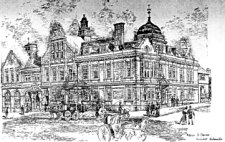
[From 1900 Examiner Annual]
.
THE Town Hall, situate in Ridgeway Street. is a handsome and imposing building. The Town Hall was erected in 1899 from the designs of Mr. Arthur Ardron, F.R.I.B.A. , Westminster, and cost about £12,000. In the building are included Municipal Offices, Council Chamber, Mayors Parlour, Public Library, and Fire Brigade Station.
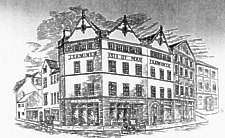
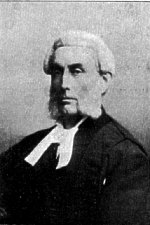
THE death of Mr. John Frederick Gill, one of Her Majesty's Deemsters for the Isle of Man, which took place on October 15th, 1899 caused widespread regret throughout the Island. The late Deemster Gill was born in Sicily, but was educated in the Isle of Man, and became a member of the Manx Bar. He was appointed Second Deemster in 1886. He took a great interest in religious, social, and archaeological matters, and was an ardent Manx patriot. He collaborated with his brother, Mr. W. H. Gill, of London, and Dr. Clague, in the publication of the "Manx National Song Book."
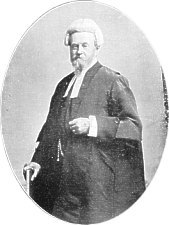
SIR ALLURED DUMBELL, Clerk of the Rolls, was born in the Isle of Man, though of English descent. he was admitted to the Manx Bar in 1858. In the early seventies he was appointed High-Bailiff of Ranlsey, and oil t.5th March, 188o, was preferred to the Judicial Bench of the Isle of Man as Northern Deemster. He was in 1883 appointed Clerk of the Rolls in succession to the late Mr. A. W. Adams. In 1899 his honour was Knighted. During the absence front the Island, through illness, of his Excellency the LieutenantGovernor, Lord Henniker, in the autumn of 1899, his Honour acted as Deputy-Governor.
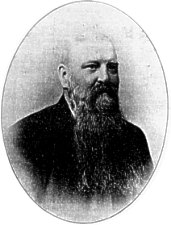
MR. DALRYMPLE MAITLAND, one of the members of the House of Keys for Middle Sheading. is a son of the late Mr. John Maitland, for many years proprietor of the Liverpool Mercury. In early manhood Mr. Dalrymple Maitland joined his uncle, the late Mr William Dalrymple, M. H.K, in the conduct of the Union mills (woollen and grain), but retired from business several years ago. Mr. Maitland is Chairman ot the Isle of Mail Banking Company; Limited, and is a director of the Isle of Man Steam Packet Company, Limited, and of the Isle of Man Railway Company, Limited.
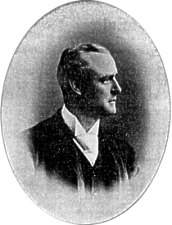
MR. JAMES STOWELL GELL, High-Bailiff of Castletown, is a son of Sir James Gell, First Deemster. Mr. Gell was admitted a member of the Manx Bar in 1878, and soon made a name for himself as an able advocate. In 1892 he was appointed High-Bailiff of Castletown in succession to the late Mr J. M, Jeffcott
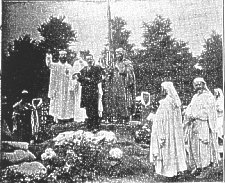
The above illustration depicts Mr. A. W. Moore, Speaker of the House of Keys, receiving the honorary Druidic Degree conferred upon him at the Welsh National Eisteddfod held at Cardiff in 1899. Mr. Moore is one of the members of the House of Keys for Middle Sheading, and in 1898, on the death of Mr John Goldie Taubman, was appointed Speaker of that ancient and honourable legislative assembly. The degree of Druid (the highest given by the Eisteddfod) was conferred upon Mr. Moore in recognition of his splendid services to Manx literature.
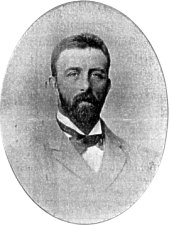
MR. EDWARD B. GAWNE, of Kentraugh, is the eldest son of the late Mr. Edward Gawne. Mr. Edward B. Gawne became entitled to the extensive Kentraugh estates as heir to his grandfather, the late Mr. Edward Moore Gawne, of Kentraugh, for many years Speaker of the House of Keys. in early manhood Mr Edward B. Gawne proceeded to Tasmania, where he resided for many years. Last year (1899) he returned to his ancestral home, Mr. Gawne is head of the most influential family in the Isle of Man.
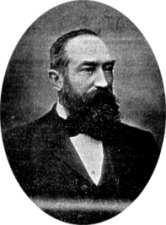
MR. JOHN BOYD, of Ballaquayle Cottage, Chairman of the Douglas Poor Relief Committee, is one of the most useful men in Douglas. A Manxman by birth, he, while yet a young man, went to Australia, where he spent several years. On returning to Douglas he actively and successfully engaged in work for ameliorating the condition of his poorer fellow citizens. He has for six years been elected Chairman of the Douglas Poor Relief Committee, and is a member of the committee of the House of Industry, the Industrial Home for Orphan and Destitute Children, and other of the charitable institutions. Mr Boyd also takes an indefatigable part in the conduct of the Isle of Man School of Art.
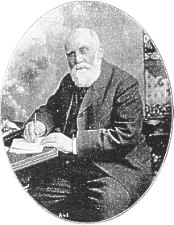
MR. COWIN has taken part in the public life of the Island for more than half a century. When a youth, he was Honorary Secretary for the Sunday Closing movement, from 1846 to 1857, when the Sunday Closing Act became law. He has spent nearly half his life-time in England, where he identified himself with all the " forward movements"-temperance, social, and political reform, peace, anti-slavery, anti-State Church, etc. As a member of the Douglas Town Board, he initiated some useful reforms. He was also for a period a member of the Douglas School Board. In January last he was the recipient of a beautiful and costly testimonial from his many admirers on the Island,
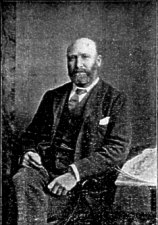
MR CHARLES BANKS NELSON is a member of an old and respected Manx family. He is chairman of the Manx Northern Railway, a director of Dumbell's Banking Co., and of other companies. In the year 1898 he was appointed Captain of Bride — the parish of which his grandfather, the late Rev. John Nelson, and his father, the late Rev. Daniel Nelson, were for many years rectors.
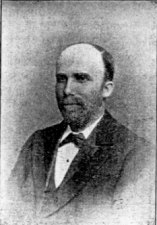
MR. McDOWALL was appointed in 1898 to succeed Mr. J. Cameron as Secretary and Manager of the Manx Northern Railway Company. He was for some years Manager of the Ayrshire and Wigtownshire Railway in Scotland.
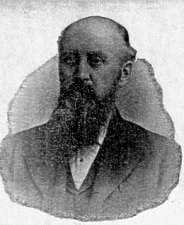
THOUGH not a Manxman by birth, Mr. John Barron, merchant, of Douglas has a most patriotic regard for the country of his adoption. He served a term on the Douglas Town Council, and was also a Town Commissioner before the days of incorporation. At present Mr. Barron is one of the most indefatigable and progressive members of the Douglas School Board, and is Chairman of the Finance Committee of that body.
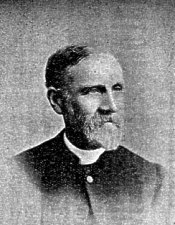
IS Chairman of the Isle of Man Wesleyan District, and has also filled the chairs of the Cornwall, Swansea, Portsmouth. and Macclesfield Districts. Though having travelled forty years, he still retains much of the activity, mental and physical, of a young man.
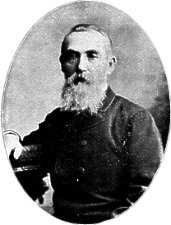
IS a native of Peel. After having served a year's apprenticeship at sea (which gave him a taste for marine life which has never left him), he became a medical student, and, on qualifying, practised for many years in London. in 1890 he retired from practice, and came to reside in Peel. Dr. Faraker takes a great interest in social and political movements, and is one of the best authorities on the temperance question in the Island. At the last general election for the House of Keys he unsuccessfully contested Glenfaba Sheading. He is a director of S. K. Broadbent & Co., Limited.
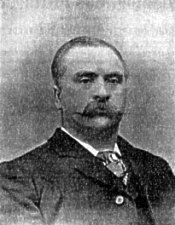
MR. JOHN COSTAIN, the genial and energetic Hon. Secretary of the Liverpool Manx Society, has probably done more to advance the interests and welfare of Manx people in Liverpool than any other man living. Mr. Costain is a native of Douglas; he served his apprenticeship to the grocery and wine and spirit trade with the late Mr. William Allen, and migrated to Liverpool some 27 years ago. The Liverpool Manx Society's usefulness is in great measure due to the work of the indefatigable Secretary. Mr. Costain is well known and highly respected in Liverpool musical and Masonic circles. He is Hon. Secretary of the Liverpool Musical Society, numbering close on 400 voices.
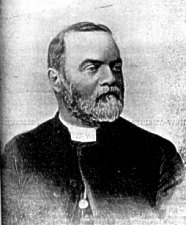
PERHAPS the Manxman best known to English people is the Rev. F. J. Moore, Vicar of Kirk Braddan. Canon Moore graduated B.A. Trinity College, Dublin), in 1861. He was ordained deacon in 1863, and priest in 1864. In 1888 he was appointed to succeed the late Rev. William Drury as Vicar of Braddan, after having been Vicar of Lonan nine years.
|
|
||
|
|
||
|
Any comments, errors or omissions
gratefully received The
Editor |
||